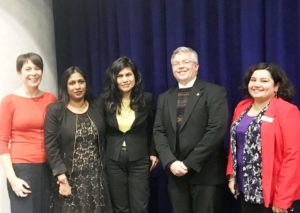
Gender bias, both ‘unconscious and conscious’, is being challenged by the State Government and a group of female scientists aiming for 50:50 representation in Science, Technology, Engineering and Mathematics (STEM) careers for females.
South Australia’s Minister for Higher Education and Skills, Dr Susan Close, showed her support for the South Australian ‘node’ of the national University of NSW Science 50:50 – Inspiring Girls into Science at Flinders University’s innovation and research precinct at Tonsley.
The launch comes as international research conducted by the OECD shows girls and boys remain deeply divided in career choices – and girls are making those choices earlier than we had previously thought.
The report showed gender bias – conscious and unconscious – among parents, teachers and employers was partly responsible, and concluded that a concerted effort by parents, teachers and employers to open girls’ minds to their abilities and future careers was needed.
It also found that girls’ lack of self-confidence in their own ability in science and mathematics may be partly responsible for under-achievement by girls in STEM subjects.
The ‘Science 50:50’ program will include:
- A web portal run by the STEM: Women Branching Out group to introduce and showcase Australian innovators and link aspiring girls and young women to 50:50 mentors
- Audio visual resources, media contacts and online resources
- Links to universities, research organisations and industry
- Industry immersion, mentoring and networking opportunities to enable girls to get experience and a foot into scientific careers.
“I’m interested in ways we can engage girls’ interest in STEM subjects from a young age, and, just as importantly, in holding their interest as they grow up to consider their career choices,” says Minister Close.
“Many future jobs will rely on a workforce with STEM skills, and I hope that programs like this will help inspire girls to enter these exciting fields.”
Flinders University’s Dr Maria Parappilly said Flinders’ former Executive Dean of Science and Engineering, Professor Warren Lawrence, had made funding for the South Australian node contest/activities possible, and that Flinders was excited to be leading SA’s Science 50:50 node.
“We want to increase the number of female students taking Science subjects at school by sparking young women’s interest in STEM in a creative and engaging way,” Dr Parappilly says.
“Young female students should not be afraid of the STEM field but be instead by embracing the vast array of opportunities that it offers to them.”
Professor Veena Sahajwalla is the key instigator of the ‘Science 50:50’ program funded through the ARC Georgina Sweet Award funding. The SA node of Science 50:50 is being launched by the UNSW Scientia Professor Sahajwalla.
Through her research, Professor Sahajwalla, who directs the Centre for Sustainable Materials Research and Technology (SMaRT) at UNSW, has completely changed how the properties of carbon-bearing materials are understood, including graphites, plastics and rubber tyres.
STEM Women Branching Out group also won a National Science Week grant entitled ‘Science 50:50 – Changing the Face of Science’ which enabled the SA launch. The grant applicants were Flinders’ Dr Maria Parappilly, Professor Amanda Ellis, Associate Professor Karen Burke Da Silva and Dr Sherry Randhawa.
More about ‘Science 50:50 – Changing the Face of Science’ in South Australia
- Engages girls with science and technology via school visits and outreach programs, and will provide a clear pathway to STEM futures
- Facilitates industry immersion, mentoring and networking opportunities to enable girls to get experience and a foot into STEM careers
- Runs the Flinders Uni Aurora Photo Contest, which is open to female students in years 11 and 12 in South Australian schools.
- Coordinates STEM related careers through initiatives like its Thinker in Residence and Leader Lab programs.
For more information on ‘Science 50:50 at Flinders’, please email stemwomen@flinders.edu.au

